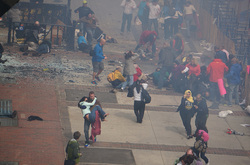 April, 2013 When the news broke about the bomb at the Boston Marathon, most of us reacted, understandably and appropriately, with horror, grief, and anger. Some may have even cried instinctively, “Oh, the humanity!” a phrase made popular by the reporter who uttered these words after witnessing the explosion of the Hindenburg in 1937. Thirty-six died that day. Three dead and over 140 injured in Boston. We feel the humanity, i.e. the “masses” as well as the “compassion.” We are instantly connected to them and feel their pain. We share their suffering. We identify. Any feeling person is able to empathize with people caught in such tragedies. If we cannot, we should probably be reading the barometer of our moral and emotional sensitivities to see if something is broken and why. Unlike with the Hindenburg tragedy, in the Boston bombing there are other characters in the story besides the victims. There are the perpetrators bent on violence. So, on the flip side of our cries of grief, we also cry for justice to right the wrong, and this instinct also should assure us we are human. Some of us, also, may have uttered, “Oh, my God!” at the sight of this bombing. More than cursing, such a cry is possibly the most appropriate of all because, in essence, it embraces both the feelings of humanity, grief mixed with anger, and a belief in the only One who could possibly make sense out of this horror or offer a proper response. God’s incarnation in Jesus tells us he identifies with us in our suffering. Jesus is also God’s response to the cries for justice as he comes not only as savior but as judge. “Vengeance is mine,” says God. So, when we genuinely cry, “Oh, my God!” our agony and outrage become not simply our identification with humanity but our identification with God in his suffering and in his working out of justice. In such tragedies as Boston, there is one person we usually overlook in our identification with humanity. As repulsive as this may sound, we must also identify with the bomber. He is one of us. The darkness that lurks in these culprits is in all of us. In a universal sense, we share in their guilt. In small ways every day, we hurt and maim those around us with our thoughts and actions, even those we love the most! Jesus said that we cannot afford a posture of self-righteousness because when we even so much as harbor anger against someone, we face the same judgement as a murderer (Matthew 5:21-22). But there is hope and forgiveness when we can genuinely cry, “Oh, my God!”At its base, this is the cry of the priest who stands between God and the world. It is both a cry of horror at human suffering and at our own culpability in it. But it is also a cry of faith, a cry for God to identity with our pain and guilt and do something about it. If nothing else, the horror of Boston should incite us to become partakers. It should provoke us to ask how well we actually know those around us. Do we take the time to identify with each other's alienation, longings, and pain? Do we also have the courage to face each other's sins and darkest thoughts? When we partake in each other’s suffering and partake in each other’s guilt as though they were our own, we proclaim the Kingdom of God has come. We proclaim both “Oh, the humanity!” and “Oh, my God!”
0 Comments
|
Archives
January 2024
Categories |
 RSS Feed
RSS Feed